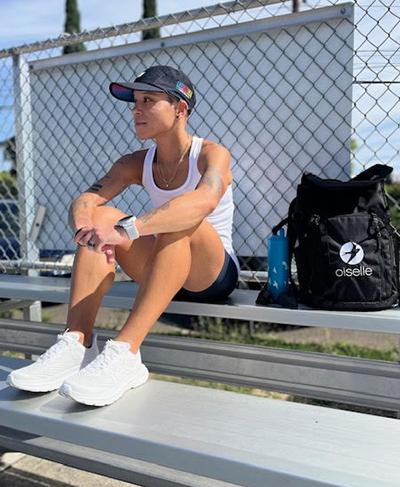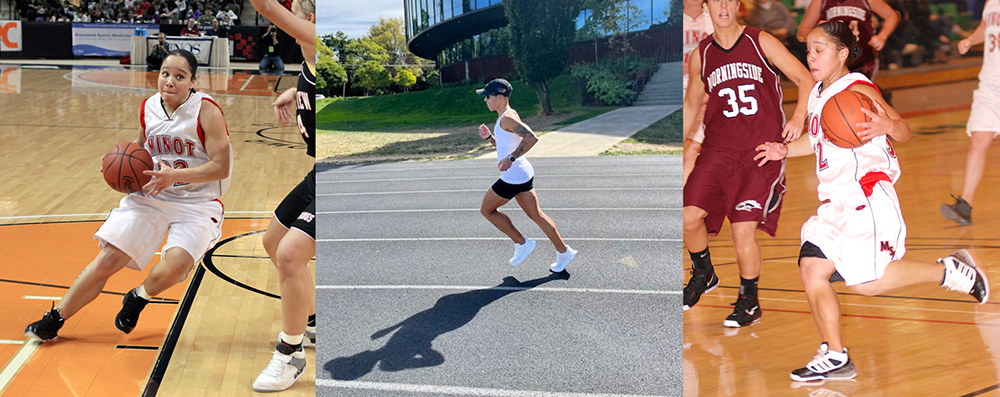Hendrix-Roach finds her passion on the pavement

PORTLAND, ORE. – Following a breakout performance at the 2022 California International Marathon, Ari Hendrix-Roach ’12/15 became the second fastest U.S.-born Black female marathoner in history.
As impressive as that stat is by itself, it is even more surreal to think she started competitive running just 10 years prior.
“If someone had told me while running circles on the third floor of the (Minot State) Dome that one day I would be the third fastest (second at the time, now third overall) African American female of all time, I think I would have said that’s pretty wild,” Hendrix-Roach said. “It’s unbelievable to think about, but I’m super grateful for all the people who have believed in me along the way.”
Her time of 2 hours, 35 minutes, 46 seconds qualified her for the 2024 U.S. Olympic Marathon Trials set for Feb. 3 in Orlando, Florida.
Hendrix-Roach, who played and coached at Minot State, started her running career to pay tribute to her father, who died by suicide during her senior year, her only season as a standout for MSU.
“I decided to specifically do a marathon because he thought I would be a runner,” she said. “My life ended up going to basketball, but after my last season, I tried to go pro, but that didn’t necessarily work out, and I started running to keep fit. I wasn’t really a huge fan of running but decided to sign up for a marathon to pay homage to him.”
She ended up running the Bismarck Marathon in 2012, finishing with a time of 3:57. She had accomplished her goal of honoring her father, but she had also caught the bug.
Following a year of training while finishing her master’s degree in management information systems (she earned her undergraduate degree in corporate fitness), which included many laps on the third floor with then-Beavers head coach Sheila Green Gerding, she returned to Bismarck.
She won the 2013 event, shaving an astonishing 41 minutes off her time.
“We ran on the third floor a lot, and sometimes outside, but, yeah, I guess you could say she was my training partner,” Hendrix-Roach laughed. “In 2018, I broke three hours, I think a 2:57. The Olympic qualifier time then was 2:45 — 13 minutes, that’s close, I could try for that. The last five years, I feel I’m at a place where I can do something more than I originally thought.”
Breaking three hours also put her in a different conversation when it comes to marathon runners and gave Hendrix-Roach a different mindset about running. Lowering her time to 2:35 vaulted her up the list.
“Breaking that barrier certainly put me on the road, but it didn’t necessarily break down any barriers as far as my professional life,” she said. “But it got my name out there and people started to pay a little more attention. It made me realize it was time to shift the dynamic. I hired a coach and changed my approach to running. I’ve had a few coaches who have helped me learn more and more about running.”

Hendrix-Roach, who now lives in Portland, Oregon and works as a running wear analyst for HOKA, enters the Olympic Trials with a blend of massive dreams and a level head.
“This spring is a really big deal in my career,” she said. “Along with the trials, I’m running in the pro field in Boston in April and those have been really big things for me, lifetime achievements.
“But there are a lot of things on my list. I do have aspirations of being No. 1 and want to work toward the 2028 Olympic Trials. There are more things to accomplish. I just want to make sure I take the time to soak it all in while I’m there.”
While Hendrix-Roach is confident in her athletic abilities, she hasn’t always been confident in herself. During her time at MSU, she regarded herself as quiet and shy. As an adult, she has struggled at times with her mental health. She continues to make strides every day.
“I think I’ve had to come out of my shell a little as some of the jobs I’ve had have forced it,” she said. “I never thought it would be possible to get here, and it takes a lot of people believing in me and me believing in myself. That’s something I work on every day.
“I’ve had some really dark moments since leaving Minot State and really scary times where I was in a dark place and didn’t know if I would come out of it. But I’ve had some great people around me that have helped me with that. I’ve had therapists and psychologists who have helped me, and I have definitely worked on myself.”
Part of that growth is representing multiple communities of runners she didn’t necessarily see when she started.
“I have more growing to do, but I want to be a voice for people who maybe want to run and can see someone like them,” she said. “I didn’t see many people like me coming up. I try to be open about my life, and hopefully, people can relate to that. I want to be that voice for the African American community and the LGBTQ+ community where they can see themselves reflected in me — in running or whatever they are doing.”
Hendrix-Roach’s one season at MSU was a memorable one. She broke the school record for assists in a game in her first outing as a Beaver, a 103-94 overtime win over then-No. 1 ranked Morningside (Iowa) University. She was named an NAIA All-American, All-Dakota Athletic Conference honors, and helped lead MSU to the 2009-10 NAIA National Women’s Basketball Tournament.
She feels her career in collegiate basketball helps her prepare for a meet of this magnitude.
“My basketball career and playing in big games helps me in what it takes mentally,” she said. “I can take some of that, trying to stay calm and not getting too worked up. I just like letting things come to me. In basketball, you can’t force things and in running, I can’t force paces.”
About Minot State University
Minot State University is a public university dedicated to excellence in education, scholarship, and community engagement achieved through
rigorous academic experiences, active learning environments, commitment to public service, and a vibrant campus life.
Published: 01/29/24




